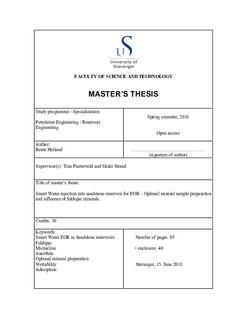| dc.contributor.advisor | Puntervold, Tina | |
| dc.contributor.advisor | Strand, Skule | |
| dc.contributor.author | Hetland, Bente | |
| dc.date.accessioned | 2018-10-18T12:52:32Z | |
| dc.date.available | 2018-10-18T12:52:32Z | |
| dc.date.issued | 2018-06-15 | |
| dc.identifier.uri | http://hdl.handle.net/11250/2568686 | |
| dc.description | Master's thesis in Petroleum engineering | nb_NO |
| dc.description.abstract | Smart Water is an injection brine that has been modified and designed for inducing wettability alteration to increase oil recovery in a reservoir. It is an cost effective and environmentally friendly EOR method that can be easily implemented both in secondary and tertiary production phases. Smart Water EOR in sandstone reservoirs are highly complex due to chemical interactions in the crude oil-brine-rock system. Sandstones are a mixture of several minerals, each contributing with different reactivity and behaviour dependent on pH, salinity, temperature and pressure. To optimize the Smart Water design, great understanding of the initial wetting in the reservoir and the wettability alteration during a Smart Water flood is important. Feldspars have shown to influence pH in a reservoir system, which could impact both the initial wetting in a reservoir and the wettability alteration when Smart Water is injected. Polar organic components can be adsorbed to a clay surface and influence initial wetting.
To study the influence of feldspar minerals regarding initial wetting static adsorption tests were made. For a wettability alteration to take place, initially adsorbed polar organic components must be desorbed from the mineral surface. This adsorption / desorption is controlled by an increase in pH. Feldspars influence on pH and dependence on salinity were studied from static pH screening tests and IC analysis. Previous studies at the University of Stavanger have shown that the preparation of the feldspar mineral samples greatly can influence the adsorption results. To optimize the mineral samples new milling equipment has been used in the preparation process. Adsorption studies have been conducted on two feldspar minerals; microcline and anorthite, using both high salinity (HS) and low salinity (LS) brine at ambient temperature conditions. Static pH screening studies have been conducted at ambient temperature for the anorthite sample, using NaCl brines with different salinities.
The results from the adsorption studies are in line with previous findings. Feldspars are capable of adsorbing some polar components onto the surface, however it was not possible to quantify their adsorption behaviour or dependence on pH and salinity in detail due to varying results that did not show any trends. The only conclusion that can be made is that there is some adsorption and that the adsorption is generally low.
The optimized feldspar samples did not manage to provide representative adsorption results, but managed to produce stable results in the pH screening test. A major difference between the two tests is the addition of the organic phase in the adsorption tests. The combination of three phases (polar organic component-brine-mineral) made the system chemically complex and added extra uncertainty. This resulted in varying and unstable adsorption results. Static pH screening tests and IC analysis of anorthite verified that feldspar is influencing pH in a system through cation exchange at that this is dependent on salinity.
Further work is needed to optimize mineral samples, as they are an important part in continued analysis in understanding feldspars contribution both regarding initial wetting and in a Smart Water flooding for EOR. The preparation of minerals are the first of many steps in the adsorption studies, and have shown to be very important. Especially the PSD of the mineral sample will greatly influence the reactivity of the feldspars, and needs to be controlled. Bad preparation results in non representative static results which could cause misleading conclusions in dynamic studies. | nb_NO |
| dc.language.iso | eng | nb_NO |
| dc.publisher | University of Stavanger, Norway | nb_NO |
| dc.relation.ispartofseries | Masteroppgave/UIS-TN-IEP/2018; | |
| dc.subject | petroleumsteknologi | nb_NO |
| dc.subject | petroleum engineering | nb_NO |
| dc.subject | microcline | nb_NO |
| dc.subject | anorthite | nb_NO |
| dc.subject | feldspar | nb_NO |
| dc.subject | optimal mineral preparation | nb_NO |
| dc.subject | wettability | nb_NO |
| dc.subject | adsorption | nb_NO |
| dc.subject | smart water EOR in sandstones | nb_NO |
| dc.title | Smart Water injection into sandstone reservoirs for EOR - Optimal mineral sample preparation and influence of feldspar minerals | nb_NO |
| dc.type | Master thesis | nb_NO |
| dc.description.version | submittedVersion | nb_NO |
| dc.subject.nsi | VDP::Teknologi: 500::Berg‑ og petroleumsfag: 510::Petroleumsteknologi: 512 | nb_NO |
